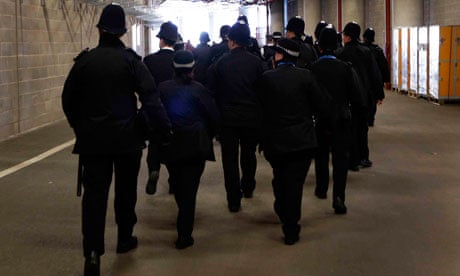A chief constable will join more than 20,000 rank and file police officers from England and Wales in a protest march against "cuts and privatisation" this week.
In the strongest demonstration of anger available by law to the police, officers will carry banners declaring the cuts are "criminal" as they march past the Home Office and down Whitehall in London.
The march comes as some rank and file officers are demanding full industrial rights to withdraw their labour – something which as crown servants, they are not legally entitled to do.
Among the thousands of police – all of whom have to take a day off to take part –will be Tony Melville, chief constable of the Gloucestershire force, who last month announced he was quitting over the changes to policing.
Melville has already spoken out publicly against the cuts and reforms, including the election of police and crime commissioners. He told fellow officers he would be joining them on the march on Thursday via his Twitter feed.
"Thanks for supportive msgs after my resignation. Regularly support my officers in expressing their views. Taking leave to be in L'don on 10/5," Melville wrote.
A spokesman for Gloucestershire police said the chief constable did not want to make any further comment.
"Mr Melville believes it is important to support officers in expressing their legitimate views," she said. "He regularly attends events … to show support for his officers … and he is proud to do so with this march as well."
No other chiefs have publicly declared they will be attending, but many have expressed support privately, according to the chair of the Police Federation, Paul McKeever. Others, however, remain committed to driving through the changes to working conditions, pay and pensions and the cuts that the government requires.
Peter Fahy, chief constable of Greater Manchester police and the Association of Chief Police Officers lead on workforce development, said he had "huge sympathy for our police officers undergoing a pay freeze and changes to pension entitlements".
But he said he would not be joining them on the march, adding: "We have the opportunity to build a new pay system which recognises the expertise and professionalism of police officers and helps forces to retain and develop high quality staff … I believe that policing has to make its contribution to the reduction in public spending and we cannot pass our debts on to the next generation."
More than 1,200 of Fahy's officers are travelling to London on Thursday, while more than 1,000 are expected from the West Midlands force and some 3,000 Met officers have said they will be taking part in the demonstration, which begins at Millbank.
McKeever said officers had felt driven to act because the police service was under threat from a "volatile mix" of reforms and cuts being imposed by the government. They include, he said, 20% cuts to force budgets; reductions in police pay, which for some constables would mean losing thousands of pounds a year; changes to working conditions; creeping privatisation of the service; cuts to frontline officers of more than 5,000 in the last year alone; and the politicisation of policing with the election of police and crime commissioners.
"These changes will be catastrophic," said McKeever. "There will be more civil disorder and there will be more crime."
Anger within the rank and file is at its greatest for many years, federation representatives say.
Jackie Bowen, secretary of the Greater Manchester police federation, said there was growing anger and frustration among officers at the inability of the organisation to call a strike.
"It is overwhelming, we are getting emails and messages every day saying; 'Why can't we go on strike?'" she said.
"It's about having industrial rights to help us in our fight against such rapid and detrimental changes to the way police officers work."
The Police Federation nationally has promised officers it will hold a ballot on whether members want the right to strike later in the year.
Ian Pointon, chair of the Kent federation, told his members last week Acpo had "sold us down the river".
He highlighted the "privatisation" in forces such as Surrey and the West Midlands – where private contractors are bidding for roles to investigate crime, detain suspects, disrupt criminal networks and respond to incidents – as the real aim of the government.
"Police officers will be transformed into the equivalent of France's CRS, whilst the local patrols will be provided by G4S or some other company. It's a recipe to give 'private clampers' domain over the public. It's a recipe for disaster," he said.



